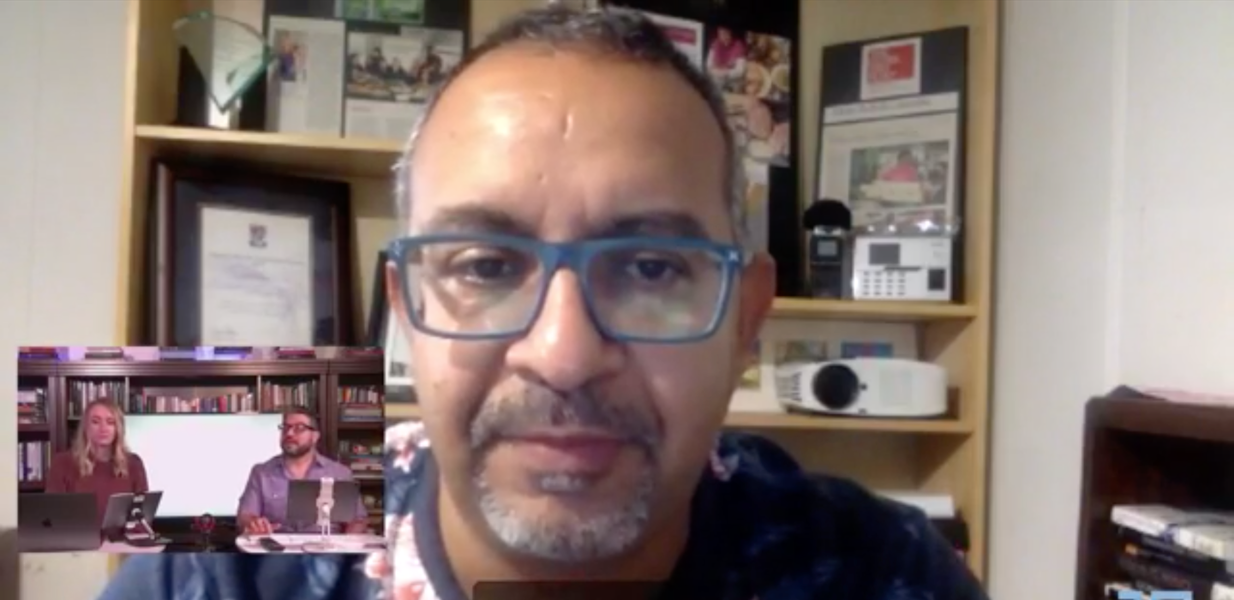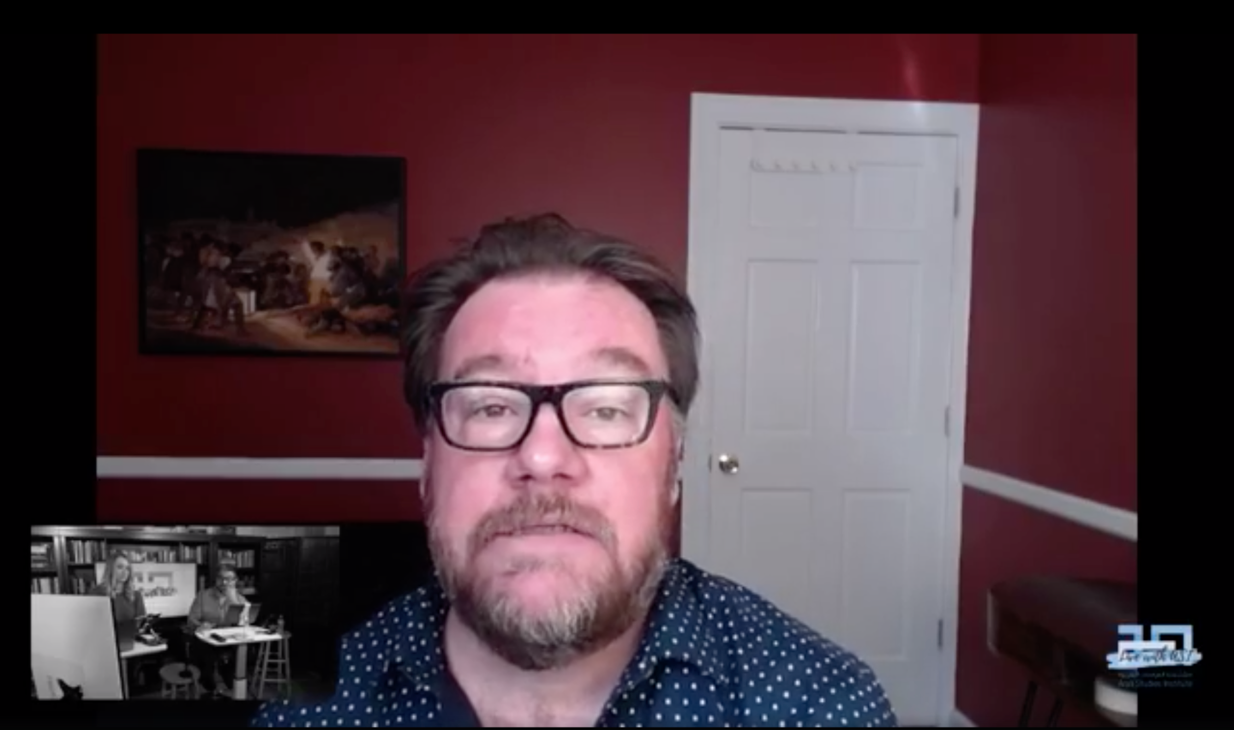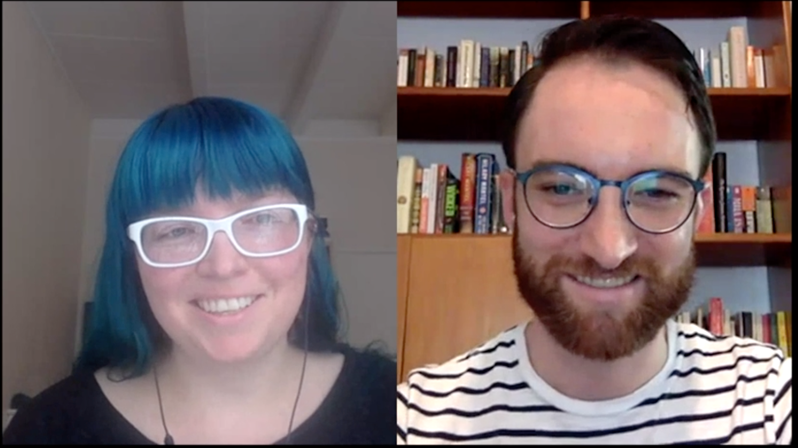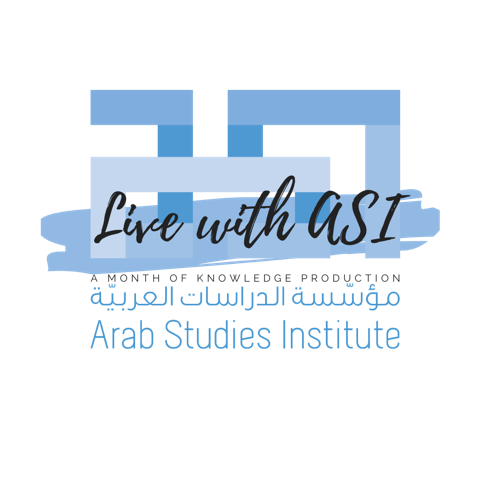Live with ASI is a new monthly broadcast program that showcases recently published content from the Arab Studies Institute’s various branches. This content includes articles, reviews, pedagogical resources, podcasts, and more. Also featured in the broadcast are brand new interviews and discussions with various authors and contributors. In this episode, hosts Bassam Haddad and MK Smith discuss developments throughout the region, and themes such as culture, dissent, and pedagogy. Interviews for this month are Ilan Pappé with Carly A. Krakow, Omar Dahi with Bassam Haddad, Caroline McKusick with Jonathan Adler, Arun Gupta with Carly A. Krakow, and Stacy D. Fahrenthold with Jacob Bessen. Guests are Adel Iskandar and Sinan Antoon.
All of the materials mentioned in the Live with ASI broadcast are listed here, categorized by their themes. Also listed are additional recent materials we highly recommend, as well as recent and upcoming live events. Pieces that are relevant to multiple themes are listed under each applicable theme below.

NEWTONs
On our New Texts Out Now page, or NEWTONs for short, authors and publishers provide insight into their work and discuss a variety of issues related to their published texts. These are all the NEWTONs discussed in the show. Note that some NEWTONs will be listed again under other themes.
- Generations of Dissent: Intellectuals, Cultural Production, and the State in the Middle East and North Africa by Alexa Firat and R. Shareah Taleghani (eds.)
- Contesting the Iranian Revolution: The Green Uprisings by Pouya Alimagham
- The Wandering Holy Man: The Life of Barsauma, Christian Asceticism, and Religious Conflict in Late Antique Palestine by Johannes Hahn and Volker Menze (eds.)
- Imagining Afghanistan: The History and Politics of Imperial Knowledge by Nivi Manchanda
- An Army Like No Other: How the Israel Defence Forces Made A Nation by Haim Bresheeth-Zabner
- Arab Americans in Film: From Hollywood and Egyptian Stereotypes to Self-Representation by Waleed F. Mahdi
- Selling War and Peace: Syria and the Anglosphere by Jack Holland
- Archive Wars: The Politics of History in Saudi Arabia by Rosie Bsheer
- Cosmopolitan Radicalism: The Visual Politics of Beirut’s Global Sixties by Zeina Maasri
Culture
From revisiting Camus and exploring his political positions, to examining cinematic forms of exclusion of Arab Americans in the US and the Arab world, and highlighting Palestinian cultural initiatives, the following Jadaliyya and NEWTON pieces provide insight into often under-valued aspects of the region.
- Albert Camus, the Plague, and Race by Youcef Oussama Bounab
- Arab Americans in Film: From Hollywood and Egyptian Stereotypes to Self-Representation (NEWTON) by Waleed F. Mahdi
- Indigenous Sufi Theatre in Palestine: Rain Summoning in the Performances of Bint-Mbareh by Dia Bargouti
- The Imam and the Poet by Furqan Sayeed

Adel Iskandar speaks with hosts Bassam Haddad and MK Smith aunch a new Live with ASI segment provisionally titled “Beyond New/Old Media: Knowledge Production/Consumption After Covid-19.”
Palestine
In light of the recent normalization agreements between the Gulf and Israel, the ASI team analyzes impacts on the general state of civil rights in the region and the question of Israeli annexation of the West Bank. In addition to the publications and interviews mentioned in the broadcast, you can check out Jadaliyya Co-Editor Noura Erakat on Democracy Now!, and Jadaliyya Co-Editor Mouin Rabbani on TRT World, discussing the implications of the Abraham Accords on Palestine and the region.
On air in this episode: an interview with Historian and Director of the European Center for Palestine Studies Ilan Pappé, by Carly A. Krakow.
- Jadaliyya Co-Editor Noura Erakat Discusses Trump’s Bahrain-UAE-Israel Deal on Democracy Now!
- Jadaliyya Co-Editor Mouin Rabbani Discusses Bahrain and UAE Agreements with Israel on TRT World
- Quick Thoughts: Update on Annexation of the West Bank, interview with Jadaliyya Co-Editor Mouin Rabbani by Bassam Haddad
- Jadaliyya Co-Editor Mouin Rabbani Speaks on Evolving Middle East and Geopolitical Realignments (COPAIR International Conference) by Jadaliyya Reports
- Palestine in the Wake of Israel’s Normalization Deal with Bahrain and the UAE, interview with Ilan Pappé by Khalil Bendib for Voices of the Middle East and North Africa
- In the Shadow of the Mountains: The Jordan Valley and Israel/Palestine's Marginalized East by Matan Kaminer
Ilan Pappé speaks with Carly A. Krakow.
Maghreb
Jadaliyya’s Maghreb Page has published pieces exploring the historical memory of the Algerian War of Independence, paying homage to the legacy of the former Tunisian prime minister, Ahmed Ben Salah, who passed away recently, and a statement of condemnation of the Algerian government’s repression of protesters.
- Colonial Algeria: The Silence of Our Fathers by Dorothée Myriam Kellou
- Ben Salah and the Fate of Destourian Socialism in Tunisia in the 1960s by Idriss Jebari
- Algeria: For the Freedom of the Prisoners of the Hirak by Jadaliyya Reports
Gulf
Rosie Bsheer’s NEWTON explores Saudi Arabia’s historical production, and a Jadaliyya piece highlights the plight of migrant workers and social structures of marginalization, in light of the pandemic. Additionally listed are texts and interviews of Jadaliyya co-editors examining recent normalization of relations between the Gulf and Israel.
- Jadaliyya Co-Editor Noura Erakat Discusses Trump’s Bahrain-UAE-Israel Deal on Democracy Now!
- Jadaliyya Co-Editor Mouin Rabbani Discusses Bahrain and UAE Agreements with Israel on TRT World
- Jadaliyya Co-Editor Mouin Rabbani Speaks on Evolving Middle East and Geopolitical Realignments (COPAIR International Conference) by JadaliyyaReports
- Archive Wars: The Politics of History in Saudi Arabia (NEWTON) by Rosie Bsheer
- COVID-19 and Urban Marginalization in Saudi Arabia by Noor Tayeh
- The Modernist Roots of Islamic Autocracy: Shaykh Abdullah Bin Bayyah and the UAE-Israel Peace Deal by David H. Warren

Sinan Antoon speaks about Jadaliyya's Arabic content production and invites audience members to submit content to the Arabic section.
Solidarity Academies
Jadaliyya will be featuring links to the work of a number of “Solidarity Academies,” which were founded by Turkish academics facing repression from the Turkish government, as well as analyses of these important collective intellectual projects. Listed here is a piece by the Turkey Page Editors introducing us to these Solidarity Academies, as well as Aslı Odman’s piece, which started this initiative.
- The Solidarity Academies by Turkey Page Editors
- Solidarity Academies: Making a Virtue of Necessity? by Aslı Odman
Syria
We have a NEWTON that examines the relationship between Syria and the English-speaking world, as well as Part 2 of the roundtable conversation reflecting on the last two decades of Bashar al-Asad’s rule. We have also linked Part 1 of the roundtable, which was discussed in September’s episode. In addition, you can check out interviews with Jadaliyya’s Syria Page Co-Editor Omar Dahi, and Syrian filmmaker Soudade Kaadan.
On air in this episode: an interview on “Security in Context,” with Jadaliyya Co-Editor and Syria Page Co-Editor Omar Dahi, by Bassam Haddad.
- Selling War and Peace: Syria and the Anglosphere (NEWTON) by Jack Holland
- Roundtable Conversation: Twenty Years After Bashar Al-Asad’s Succession by Jadaliyya Reports
- Roundtable Conversation: Twenty Years After Bashar Al-Asad’s Succession, Part 2: Prelude to the Uprising by JadaliyyaReports
- Obscurity and a Drop of Hope: Interview with Syrian Filmmaker, Soudade Kaadan by Isis Nusair
- Security in Context website
Omar Dahi speaks with Bassam Haddad.
Pedagogy
ASI’s Middle East Studies Pedagogy Initiative, or MESPI, is an educational resource that curates and collects Middle East studies material for both educators and students of a variety of levels, and recently published a Newsletter and an Engaging Book Series on heritage politics with Stanford University Press. Also listed is a Scholars in Context piece, and a Status/الوضع interview on the role of the agrarian question in the Arab world.
On air in this episode: an interview with Stanford University Press Assistant Editor Caroline McKusick, by Jonathan Adler; and an interview with Stacy D. Fahrenthold on an Essential Readings about Emmigration from the Levant (1870-1930), by Jacob Bessen.
- Scholars in Context: Selin Bengi Gümrükçü
- Does the Arab Region have an Agrarian Question?, interview with Max Ajl by Omar Dahi for Status/الوضع
- Essential Readings: Emigration from the Levant, 1870-1930: A Primer in Mahjar Studies, by Stacy D. Fahrenthold
- MESPI Newsletter, Issue 1.3, October 2020
- Engaging Books Series: Stanford University Press Selections on Heritage Politics
- Archive Wars: The Politics of History in Saudi Arabiaby Rosie Bsheer
- The Missing Pages: The Modern Life of a Medieval Manuscript, from Genocide to Justice by Heghnar Zeitlian Watenpaugh
- Heritage and the Cultural Struggle for Palestine by Chiara De Cesari
- Islands of Heritage: Conservation and Transformation in Yemen by Nathalie Peutz

Caroline McKusick speaks with Jonathan Adler.

Stacy D. Fahrenthold speaks with Jacob Bessen.
Authoritarianism & Dissent
Listed below is a NEWTON on the transnational movement of cultural actors, Jadaliyya pieces discussing Egyptian social media issues, and a Quick Thoughts piece on Portland and US authoritarianism. In addition, Nasrin Sotoudeh, Iranian human rights lawyer, talks about Iranian political prisoners in light of the pandemic in an interview with Status/الوضع.
On air in this episode: an interview with Journalist Arun Gupta, by Carly A. Krakow.
- Cosmopolitan Radicalism: The Visual Politics of Beirut’s Global Sixties (NEWTON) by Zeina Maasri
- Why Nasrin Sotoudeh is on Hunger Strike to Protest Iran’s Dire Prison Conditions, interview with Tara Sepehri Far by Status/الوضع’s Malihe Razazan
- Why is the Egyptian State so Anxious about Young Women Dancing on TikTok? by Hesham Shafick
- Quick Thoughts: Arun Gupta on Portland, US Authoritarianism, and Progressive Social Movements by Arun Gupta
- The Solidarity Academiesby the Turkey Page Editors
- Solidarity Academies: Making a Virtue of Necessity? by Aslı Odman
Arun Gupta speaks with Carly A. Krakow.
Events & Announcements
In light of the waves of forest fires, scholars Zena Agha, Diana K. Davis, Salma Nashabe Talhouk, and Gabi Kirk reflected on the politics of the climate crisis and its ramifications on communities globally, at the live event, The World is Burning-Faire and Climate Crisis from the Mediterranean to the US West Coast on Thursday, 1 October 2020.
As part of the Decolonising LSE Event Series, the London School of Economics Middle East Centre is hosting an online public event titled, Environmental Justice in the Middle East: Activism, Resistance, and Decolonization on Thursday, 29 October 2020 (2 pm NYC/6 pm London/8 pm Beirut). The online discussion will feature Muna Dajani, Mona Harb, and Carly A. Krakow, and will be chaired by Michael Mason. Registration link coming soon!
On Wednesday, 21 October 2020 (1:30 pm NYC/6:30 pm London/8:30 pm Beirut),LSE’s Department of Law will host a an online live event titled,The “State of Emergency” as the Rule and Not the Exception: Crisis Conditions and Exploitative Lawmaking During COVID-19 and Beyond as part of the Shaping the Post-COVID World Public Lecture Programme.The event will feature Sinan Antoon, Carly A. Krakow, and Vasuki Nesiah, and will be chaired by Gerry Simpson. Attendance is open to all but pre-registration is required. Registration now open!
Additionally, we are happy to introduce a new platform, Alternative Frequencies | غيّر الموجة, a bilingual podcast hosted by Nadim El-Kak, and produced by Status/الوضع and the Lebanese Center for Policy Studies (LCPS). Scholars and activists will discuss and analyze a wide range of topics pertaining to the ongoing developments in Lebanon. Check out their episodes, and keep an eye for new content releases every Tuesday at 5 PM, Beirut time.
Last but not least, the Ali Vural Al Center for Global Islamic Studies (AVACGIS) at George Mason University is hosting a new webinar series titled COVID-19 and Muslim Religiosity where leading scholars explore and discuss the impact of the global pandemic on issues related to Muslim thought, theology, law, observance, and religious authority. Check out their episodes and keep an eye out for new content.



